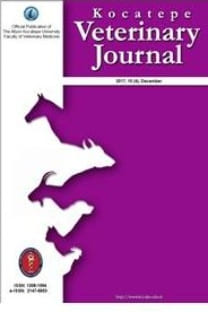Efficacy of Herbal Remedies in The Treatment of Cardiovasculer Diseases in Human and Animals
Kardiyovazküler Hastalıklar
İnsan ve Hayvanlarda Kalp Hastalıklarının Tedavisinde Bitkisel İlaçların Etkinliği
-,
___
- Agarwal KC. 1996. Therapeutic
- actions of garlic constituents. Med Res Rev. 16(1):111-24.
- Aviram M. Dornfeld L. Rosenblat M. Volkova N. Kaplan T. Presser
- Pomegranate juice consumption reduces B. 2000. BE. Zineh I. Hwang
- HS. Welder GJ. Ghannam MM. Boluyt MO. 2007. Evaluation
- immunomodulatory biomarkers in a pressure overload model of heart failure. Med Sci Monit. 13(12):255-8. extract
- on Chan JY. Yuen AC. Chan RY. Chan SW. 2012. A Review of the Cardiovascular Benefits and Antioxidant Properties of Allicin. Phytother Res. Published online in Wiley Online Library (wileyonlinelibrary.com)
- Clement Y. 2009. Can green tea do that? A literature review of the clinical evidence. Prev Med. 49(2-3):83-7.
- Daniele C. Mazzanti G. Pittler MH. Ernst E. 2006. Adverse-event profile of Crataegus spp.: a systematic review. Drug Saf. 29(6):523-35.
- Davidson MH. Maki KC. Dicklin MR. Feinstein SB. Witchger
- DK. Provost JC. Liker H. 2009. Aviram M. Effects of consumption of pomegranate juice on carotid intima-media thickness in men and women at moderate risk for coronary heart disease. Am J Cardiol. 104(7):936-42.
- Hao Y. Sun Y. Xu C. Jiang X. Sun H. Wu Q. Yan C. Gu S. 2009. Improvement of contractile function in isolated cardiomyocytes from ischemia-reperfusion rats by ginkgolide B pretreatment. J Cardiovasc Pharmacol. 54(1):3-9. Hassanpour FM. Ghule
- AE. Bodhankar SL. Dikshit M. 2011. Cardioprotective effect of whole fruit extract of pomegranate on doxorubicin-induced toxicity in rat. Pharm Biol. 49(4):377-82.
- Hsieh SR. Tsai DC. Chen JY. Tsai SW. Liou YM. 2009. Green tea extract protects rats against myocardial infarction associated with left anterior descending coronary artery ligation. Pflugers Arch. 458(4):631-42. Ikeda M. Suzuki C. Umegaki
- K. Saito K. Tabuchi M. Tomita T. 2007. Preventive effects of green tea catechins on spontaneous stroke in rats. Med Sci Monit. 13(2):40-5.
- Jadeja RN. Thounaojam MC. Patel DK. Devkar RV. Ramachandran AV. 2010. Pomegranate (Punica granatum L.) juice supplementation attenuates
- necrosis in rats. Cardiovasc Toxicol. 10(3):174-80.
- cardiac Kuriyama S. 2010. Green tea consumption and prevention of coronary artery disease. Circ J. 74(2):248-9.
- Layu M. Bhushan S. Lefer DJ. 2011. Hydrogen sulfide-mediated
- mechanisms and therapeutic potential. Clin Sci (Lond). 120(6):219-29.
- cardioprotection: Liu A. Zhang Z. 2010. Effect of GBE50 on action potentials in normal and simulated ischemic guinea pig papillary muscles. Zhongguo Zhong Yao Za Zhi. 35(17):2342-5.
- Liu TJ. Yeh YC. Ting CT. Lee WL. Wang LC. Lee HW. Wang KY. Lai HC. Lai HC. 2008. Ginkgo biloba extract 761 reduces doxorubicin-induced apoptotic damage in rat hearts
- Cardiovasc Res. 80(2):227-35.
- cardiomyocytes. Mak JC. 2012. Potential role of green tea catechins in various disease therapies: progress and promise.
- Physiol. 39(3):265-73. Exp
- Pharmacol Moore RJ. Jackson KG. Minihane AM. 2009. Green tea (Camellia sinensis) catechins and vascular function. Br J Nutr. 102(12):1790- 802.
- Nantz MP. Rowe CA. Bukowski JF. Percival SS. 2009. Standardized capsule of Camellia sinensis lowers cardiovascular risk factors in a randomized. double-blind. placebo-controlled study. Nutrition. 25(2):147-54.
- Panda VS. Naik SR. 2008. Cardioprotective activity of Ginkgo
- isoproterenol-induced myocardial necrosis in rats: a biochemical and histoarchitectural evaluation. Exp Toxicol Pathol. 60(4-5):397- 404. in Pantsi WG. Marnewick
- JL. Esterhuyse AJ. Rautenbach F. van Rooyen J. 2011. Rooibos (Aspalathus linearis) offers cardiac protection against ischaemia/reperfusion in the isolated perfused rat heart. Phytomedicine. 18(14):1220-8.
- Pittler MH. Guo R. Ernst E. 2008. Hawthorn extract for treating chronic heart failure. Cochrane Database Syst Rev. 23(1): 005312.
- Pittler MH. Schmidt K. Ernst E. 2003. Hawthorn extract for treating chronic heart failure: meta- analysis of randomized trials. Am J Med. 114(8):665-74.
- Prasad K. 2009. Flaxseed and cardiovascular health. J Cardiovasc Pharmacol. 54(5):369-77.
- Rechcinski T. Kurpesa M. 2005. Oligomeric procyanidins from hawthorn extract as supplementary therapy in patients with left ventricle systolic dysfunction. Przegl Lek. 62(4):243-4.
- Stowe CB. 2011. The effects of pomegranate juice on consumption
- and cardiovascular health. Complement Ther Clin Pract. 17(2):113-5. blood
- pressure Sumner MD. Elliott - Eller M. Weidner G. Daubenmier JJ. Chew MH. Marlin R. Raisin CJ. Ornish D. 2005. Effects of pomegranate
- myocardial perfusion in patients with coronary heart disease. Am J Cardiol. 96(6):810-4. consumption
- on Wang QM. Gong QY. Yan JJ. Zhu J. Tang JJ. Wang MW. Yang ZJ. Wang LS. 2010. Association between green tea intake and coronary artery disease in a Chinese population. Circ J. 74(2):294-300.
- Yanagi S. Matsumura K. Marui A. Morishima M. Hyon SH. Ikeda T. Sakata R. 2011. Oral pretreatment with a green tea polyphenol for
- reperfusion injury in an isolated rat heart model. J Thorac Cardiovasc Surg. 141(2):511- 7. against
- ischemia- Yin YY. Min XF. Li WZ. 2010. Effects of ginkgolide on hemodynamics in myocardial ischemic dogs. Zhong Yao Cai. 33(5):759-62.
- Zeng T. Guo FF. Zhang CL. Song FY. Zhao XL. Xie KQ. 2012. A meta-analysis of randomized. double-blind. placebo-controlled trials for the effects of garlic on serum lipid profiles. J Sci Food Agric. 92(9):1892-902.
- ISSN: 1308-1594
- Yayın Aralığı: Yılda 4 Sayı
- Başlangıç: 2008
- Yayıncı: Afyon Kocatepe Üniversitesi
Afyonkarahisar’da Tüketime Sunulan Kokoreçlerin Mikrobiyolojik Kalitesinin Belirlenmesi
Recep KARA, Savaş ASLAN, Hilmi YAMAN, Levent AKKAYA
Efficacy of Herbal Remedies in The Treatment of Cardiovasculer Diseases in Human and Animals
Timokinon: Nigella sativa’nın Biyoaktif Komponenti
Waste to Wealth Strategies: Recycling Poultry Manure
Deniz Aliç URAL, İlkay BARITCI
Afyonkarahisar İlinde Sığırlarda Enzootik Bovine Löykoz Virus (EBLV) Enfeksiyonunun Araştırılması
Akut İshalli Neonatal Buzağılarda Venöz Asit-Baz Durumu ve Renal Fonksiyon Arası Korelasyon
Durmuş Fatih BAŞER, Turan CİVELEK
Tahir KAHRAMAN, Ramazan ÜSTÜN, Fahri BAYIROĞLU, Recep ASLAN
Bir Buzağıda Akut Böbrek Yetmezliği
Durmuş Fatih BAŞER, Kemal VAROL, Z. Kadir SARITAŞ, Alper SEVİMLİ, Turan CİVELEK
Gebe Bir Kedide Abdominal Kas Rupturu Olgusunda Prostetik Materyal Uygulanması
